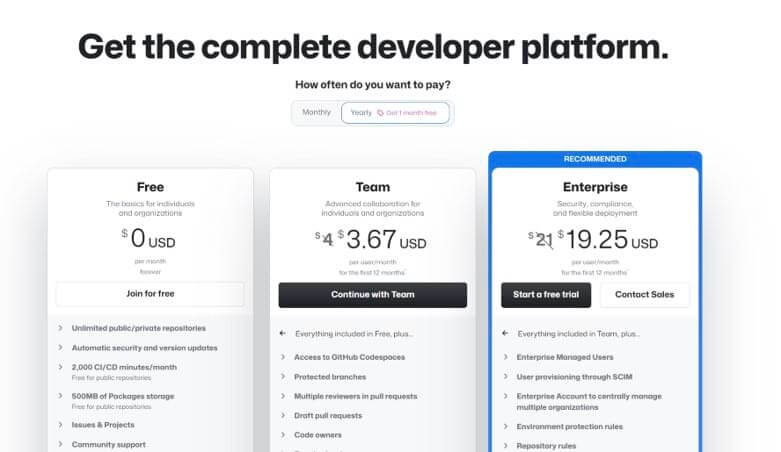Complete guide to licensing Microsoft GitHub
Introduction
The licensing of GitHub, while straightforward at its core, presents several layers that can be tailored to fit a wide range of needs—from individual users to global enterprises.
Originally designed to simplify participation in software projects, Microsoft GitHub has evolved into a comprehensive platform that supports the entire software development lifecycle. Since being acquired by Microsoft in 2018, GitHub has not only expanded its capabilities but also its integration into a broader array of developer tools.
This guide aims to unpack the licensing structure of GitHub, clarifying the distinctions between different plans and helping users make informed choices based on their specific requirements.
Whether you’re a solo developer or part of a large corporate team, understanding GitHub’s licensing options is crucial for maximizing the platform’s potential in your projects.
Topics in this guide
1. Understanding Microsoft GitHub & its offerings
GitHub is more than just a platform for hosting code. It is a complete system that supports the entire software development lifecycle, including project management, issue tracking, code review, and CI/CD.
GitHub core offer
GitHub’s core offerings include:
- Repositories: Digital directories where developers can store, manage, and track code changes.
- Branches and commits: Tools that allow developers to work on different versions of a project simultaneously.
- Pull requests and merges: Facilities for proposing changes and merging code from one branch to another after review.
- GitHub actions: Automation features that allow users to create workflows for testing, building, and deploying their code.
GitHub plans
GitHub’s plans vary widely to accommodate different user needs:
- GitHub Free ($0): Offers limited collaborators for private repositories but unlimited public repositories, making it ideal for individuals and small projects.
- GitHub Pro: Provides unlimited collaborators and private repositories with additional branch protection options, making it suitable for professional developers. No longer listed as a product on GitHub’s website, but part of their documentation.
- GitHub Team ($4): Adds sophisticated project management and team coordination tools.
- GitHub Enterprise ($21): Includes advanced security, compliance features, and system administration capabilities for large-scale organizations.

2. What are GitHub’s licensing options?
The licensing options for GitHub are designed to be flexible and scalable.
GitHub Free
- Target users: Individual developers, students, hobbyists
- Key features: Users can engage with open-source projects and manage personal projects with basic collaboration tools.
- Use case: Best for small-scale or personal projects that do not require complex collaboration tools.
GitHub Pro
- Target users: Professional developers looking for advanced tools.
- Key features: Offers unlimited public and private repositories, and includes additional code review tools, branch protection options, and GitHub Pages support.
- Use case: Ideal for individual developers who need advanced code review and management tools for private projects.
GitHub Team
- Target users: Teams that require collaborative features.
- Key features: Includes everything in Pro, plus team access controls, team discussions, and improved team management tools.
- Use case: Suitable for teams that require collaborative tools not just for coding but also for project and team management.
GitHub Enterprise
- Target users: Large organizations and businesses.
- Key features: Offers the most comprehensive suite of tools, including advanced security, compliance features, and system administration controls. Available in two versions:
- GitHub Enterprise Cloud: Managed by GitHub, providing robust infrastructure without the need for internal hosting.
- GitHub Enterprise Server: Allows organizations to host GitHub on their own servers, offering full control over data and operations, meeting stringent compliance and regulatory requirements.
- Use case: Best for organizations that require sophisticated features such as SAML single sign-on, advanced auditing, and compliance settings needed by large enterprises.
Each of these plans was made with particular user scenarios in mind, ensuring that whether you are a hobbyist or a corporate executive, there is a GitHub plan that fits your needs.
3. Who is GitHub Enterprise for?
GitHub Enterprise does not typically have a minimum seat requirement explicitly stated, meaning it can be configured to suit organizations of almost any size that need its advanced features. This flexibility allows businesses from small startups needing security and compliance tools, to large multinationals with complex operational needs, to use GitHub Enterprise effectively.
Medium to large organizations
However, pricing and the value proposition of GitHub Enterprise generally make it more suitable for medium to large organizations or teams that require its extensive features, such as advanced security protocols, comprehensive audit trails, priority support, and enterprise-level deployment options like on-premises installation.
Reach out to us today!
If you are considering GitHub Enterprise for your organization, contact us today. We can help you accurately assess your needs and provide tailored information regarding pricing, features, and any potential minimum requirements based on your specific business needs and scale.
We can provide a consultation based on your organizational structure and requirements, which will help clarify the exact benefits and configurations available to you.

4. How to choose the right GitHub plan
In order to select the appropriate GitHub plan for your needs, you need to keep several factors in mind:
- Team size: Larger teams will benefit from the Team or Enterprise plans which offer more robust tools for managing multiple users and workflows.
- Project privacy needs: If you require private repositories, GitHub Pro or higher plans provide unlimited private repos.
- Integration requirements: For teams using Microsoft products, GitHub Enterprise offers enhanced integration capabilities, providing a seamless workflow across Microsoft tools.
- Security and compliance needs: For industries that are regulated or require enhanced security, GitHub Enterprise provides additional security features and compliance certifications.
Pricing Model
GitHub’s pricing is generally based on a per-user, per-month model, which varies depending on the plan selected. Enterprise plans often involve more customized pricing, which can include volume discounts and longer-term contracts negotiated based on the organization’s size and specific needs.

5. Licensing GitHub for Enterprise Use
For large organizations, the decision to license GitHub, particularly the Enterprise version, involves a comprehensive assessment of the organization’s needs and strategic objectives.
Here’s a detailed look at key considerations and features under the GitHub Enterprise licensing model:
Customizable licensing agreements
- Per-user pricing model: GitHub Enterprise operates primarily on a per-user basis, which means pricing is scaled according to the number of users. This model is particularly advantageous for organizations because it aligns costs directly with usage.
- Flexible terms: Enterprises can negotiate terms that suit their business needs, including billing cycles, the number of seats, and the duration of the contract. Long-term contracts can often yield significant discounts and stabilize the cost over time.
Premium support and account management
- Dedicated support: One of the major benefits of GitHub Enterprise is access to 24/7 premium support from GitHub’s engineering team. This ensures that any issues can be resolved quickly, minimizing downtime and maintaining productivity.
- Account management: Enterprises receive the support of a dedicated account manager. This manager serves as a point of contact for all support needs, billing inquiries, and to help with the implementation of best practices in using GitHub.
Service Level Agreements (SLAs)
- Uptime guarantees: GitHub Enterprise offers a 99.95% uptime SLA. This high level of reliability is crucial for large enterprises where downtime can result in significant financial losses.
- Performance benchmarks: The SLA also covers performance benchmarks, ensuring that the GitHub services run smoothly and efficiently under the scale and demand of enterprise operations.
Enhanced Security and Compliance
- Advanced security features: GitHub Enterprise provides several advanced security features that are crucial for large organizations, such as SAML single sign-on, rigorous audit trails, branch protection rules, required status checks, and role-based access control.
- Compliance standards: For enterprises concerned with regulatory compliance, GitHub Enterprise supports compliance with standards such as SOC 1, SOC 2, ISO/IEC 27001, GDPR, and HIPAA among others. This compliance is critical in industries such as finance, healthcare, and government.
Enterprise deployment options
- Cloud and on-premises solutions: GitHub Enterprise can be deployed as a cloud service managed by GitHub or installed on an enterprise’s own on-premises equipment. This flexibility allows organizations to choose a deployment strategy that best fits their security policies and operational needs.
- GitHub Enterprise Server: For organizations that require on-premises installation, GitHub Enterprise Server provides the same functionalities as the cloud version but within the organization’s own data centers. This can be crucial for meeting stringent data sovereignty and security requirements.
Scalability and integration
GitHub Enterprise is designed to scale seamlessly with the growth of an organization. Whether you’re expanding the number of development teams or integrating more complex projects, GitHub Enterprise can accommodate this growth without compromising performance.
GitHub Enterprise integrates with hundreds of third-party applications and services, making it possible to create a fully integrated development ecosystem. Common integrations include CI/CD pipelines, project management tools, and code quality analyzers.
GitHub provides extensive training materials and a learning platform to help teams get the most out of their features via the GitHub Learning Lab. These resources are particularly valuable for enterprises looking to scale their operations or onboard new users.
6. Integrating GitHub with Microsoft Products
GitHub’s integration with Microsoft products enhances productivity and streamlines workflows. GitHub integrates with the following:
- Microsoft Azure: Set up CI/CD pipelines with GitHub Actions to deploy applications directly to Azure.
- Microsoft Teams: Integrate GitHub notifications directly into Teams to keep your project communication and alerts centralized.
- Microsoft 365: Utilize GitHub’s integration with Power Automate to create automated workflows between GitHub and various Microsoft 365 applications like SharePoint and Excel.
- Visual Studio: Microsoft offers GitHub Enterprise as a product in the Enterprise Agreement, and links the use of this product to their developer tool called Visual Studio. You’re able to purchase a combination product of Visual Studio Pro/Enterprise with GitHub Enterprise.
These integrations are designed to make the software development process more efficient and are particularly valuable in hybrid environments where development and operations teams work closely together.
7. Compliance and security with GitHub
Security and compliance are paramount for GitHub users, especially enterprises that handle sensitive data. Features such as branch protection, mandatory code reviews before merging, and automated security updates help maintain project integrity.
GitHub complies with major international standards, ensuring that your development processes meet necessary regulatory requirements.

8. Best practices for managing GitHub licenses
Effectively managing GitHub licenses is crucial for ensuring that your organization not only maximizes its investment but also aligns its tool usage with evolving project needs and team dynamics.
Here are some key strategies to help you manage GitHub licenses more effectively:
Regular license reviews
Conducting periodic license reviews is essential to maintaining an efficient development environment. Schedule bi-annual or quarterly reviews to evaluate:
- Identify inactive users who may no longer need access, thus freeing up licenses for new team members without additional cost.
- Assess whether your team makes full use of the features provided by your current plan. If certain premium features are underused, consider switching to a more cost-effective plan.
- As projects scale, they might require additional resources or more advanced features that are only available in higher-tier plans. Conversely, project consolidation or completion might allow you to downgrade and save costs.
Monitor usage and engagement
Utilize GitHub’s built-in analytics tools to gain insights into how different teams and projects utilize the platform.
- Check repository traffic to see which projects are getting the most use and which may be stagnating. This can help identify areas where resources could be reallocated to increase productivity.
- Analyze pull requests, commits, and issue activity to understand individual and team engagement levels. Low activity might suggest a need for training or redistributing workloads.
- Evaluate how your team uses integrations with other tools. For example, if your GitHub actions are heavily used for CI/CD, ensure that your plan optimally supports these operations.
Optimize for specific roles
GitHub offers various features that cater to different roles within a development team, and licensing should reflect the specific needs of these roles:
- Developers might require access to advanced coding tools, branch protection, and local environment integrations.
- Project Managers could benefit from project boards, issue tracking, and team management features.
- Quality Assurance teams may need access to testing tools, code review applications, and debugging software integrated into GitHub.
Educate users
Ensure that all team members are aware of the tools available to them under your GitHub license.
- Regular training sessions can help teams utilize GitHub more effectively and understand the features specific to their roles.
- Create internal resources or cheat sheets that highlight useful GitHub features, shortcuts, and best practices.
- Establish channels for feedback on tool usage and difficulties. This can help identify areas where additional training or a different set of tools might be needed.
Leverage independent expertise from third-party consultants
For larger organizations, it may be beneficial to engage with third-party consultants such as LicenseQ to optimize GitHub license management.
Our consultants specialize in software licensing and can offer customized licensing strategies, expert analysis and recommendations, integration advice and risk management. LicenseQ can help tailor a licensing plan that fits your current requirements while also scaling to accommodate future growth.
By utilizing the expertise of third-party consultants like LicenseQ, you can ensure staying compliant while also maximizing the efficiency and effectiveness of your GitHub licenses. This approach is especially useful for enterprises with complex needs or those seeking to optimize their software investment strategically.
Conclusion
Effectively licensing GitHub can transform how your team or organization develops software. By carefully assessing your needs and understanding the different plans available, you can ensure that your GitHub setup optimally supports your development goals.
FAQs
What are GitHub’s main licensing options?
- GitHub Free: Suitable for individuals and open-source projects.
- GitHub Pro: Ideal for professional developers needing unlimited private repositories.
- GitHub Team: Designed for team collaboration with additional project management tools.
- GitHub Enterprise: Best for large organizations requiring advanced security and compliance features.
How do I choose the right GitHub plan?
Consider team size, the need for private repositories, integration with other Microsoft products, and specific security or compliance requirements.
Who should consider GitHub Enterprise?
GitHub Enterprise is suitable for medium to large organizations or any enterprise needing enhanced control, security, compliance, and support.
What are the benefits of integrating GitHub with Microsoft products?
Integration with Microsoft products like Azure and Microsoft 365 enhances workflow efficiency and project management across development teams.
How can organizations manage GitHub licenses effectively?
Regularly review license usage, monitor team engagement and feature utilization, and tailor licenses to specific roles and project needs.
What security and compliance features does GitHub offer?
GitHub provides advanced security features like branch protection and mandatory code reviews, and complies with international standards such as SOC 1, SOC 2, and ISO/IEC 27001.










